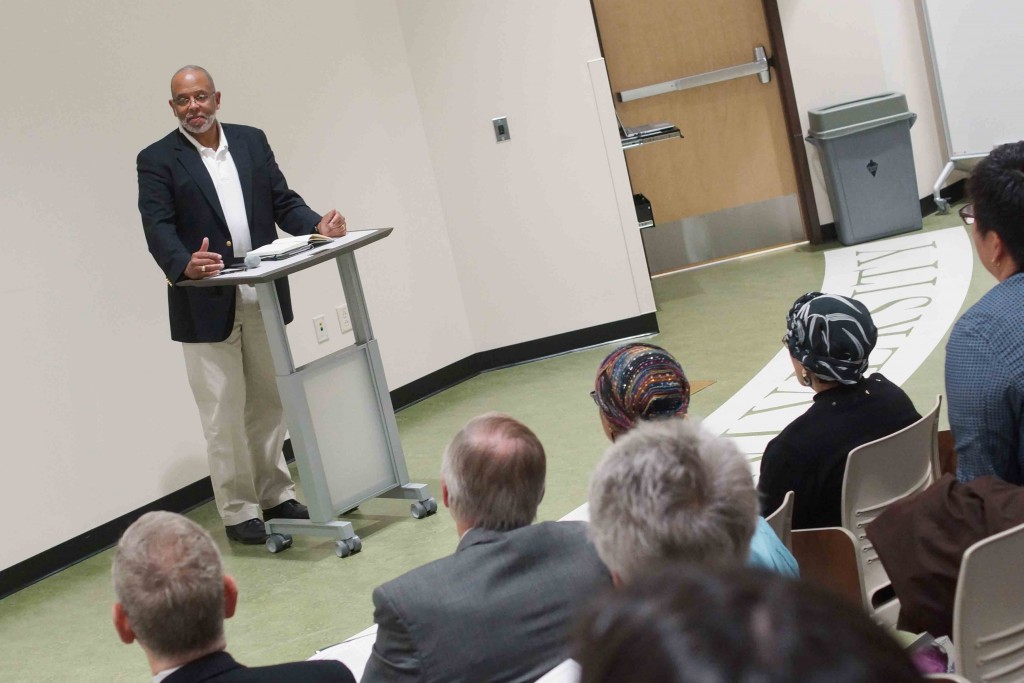
Faculty, staff and students gathered in the Admissions Center to honor the memory of Akbar Muhammad, an associate professor emeritus of history and Africana studies who passed away in early April at the age of 76.
Muhammad, the son of the Elijah Muhammad, the Nation of Islam leader from 1934-1974, grew up in Chicago and later earned his Ph.D. in African history at the University of Edinburgh. He became the founding director of Afro-American studies at Vanderbilt University before accepting a joint appointment in the department of history and in the Afro-American and African studies program at Binghamton University.
Nine people spoke about Muhammad, including his daughter Amal Muhammad, BU Provost Donald Nieman, students and professors. The short speeches focused on his contributions to the Africana studies department at the University as well as his impact on their own lives.
Michael West, a professor of sociology and Africana studies and the interim chair of Africana studies, spoke first and mentioned that the gathering was meant to celebrate Muhammad’s life and accomplishments, which include his relationship with Malcolm X, his service on the board of trustees of the American Islamic College and on the Fiqh Council of North America, his work as a correspondent for Muhammad Speak, a Nation of Islam newspaper and his editing of the book “Racism, Sexism and the World-System.”
“He was a quiet man, but also once you got to know him a little, a man of great character and dignity and great learning and passion for what he did and what he stood for,” West said.
Following West’s introduction, Eydid Ali, the president of the Muslim Students Association, gave a Qur’an recitation. Afterward, faculty and staff spoke about their memories with Muhammad and how much of an influence he had on the University in his 40 years as a professor before retiring in 2014. The memorial service ended with Rashad Williams, a graduate student, singing “A Change Is Gonna Come” by Sam Cooke.
Cynthia Marasigan, an assistant professor of Asian and Asian American studies, knew Muhammad for 21 years as his student, mentee and later on as his colleague at BU. Marasigan said that Muhammad was an inspiring teacher that greatly impacted her life.
“I remember sitting in a classroom in the Fine Arts Building hearing his booming voice, the calculated cadence of his words, his thought provoking rhetorical questions and his powerful ideas,” Marasigan said. “He explained that he considered himself a social historian and he enlightened us with new ways of viewing the world and with lessons that I carry to this day.”
Muhammad’s daughter, Amal, recited two poems in both Arabic and English and later spoke about her father’s profession as a teacher and his constant desire to learn.
“It goes without saying that my father was, among other things, a serious educator and a scholar,” Muhammad said. “He sought knowledge for the sake of learning and referred to himself as a perpetual student.”
Leo Wilton, a professor of human development and friend of Muhammad, said that Muhammad was a very generous person who was able to use his vast knowledge of African and Islamic history to teach students in an effective way.
“It’s rare to have a person who really knows African history and can teach it in a way in which it needs to be taught,” Wilton said. “But also he covered not only African history but also Islamic history culture and law, so to have him here was very important.”
Amal said that her father was constantly trying to learn and to help others achieve their goals to learn more.
“To him sharing knowledge with my mother and me was a duty and with others an act of charity,” Amal said. “He was always prepared to assist all who were on a quest for knowledge. It is our hope that his seeds, such as his thoughts and ideas, will thrive, be nurtured, blossom and re-seed.”


